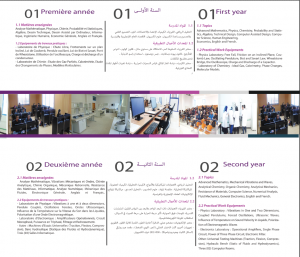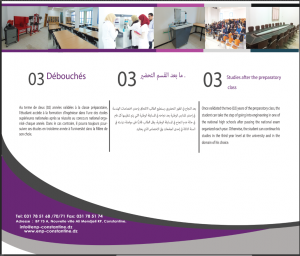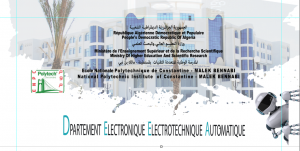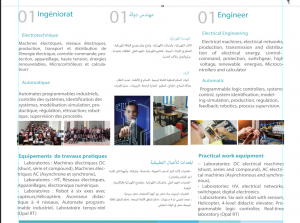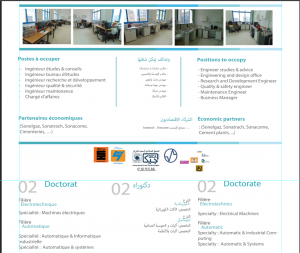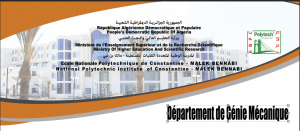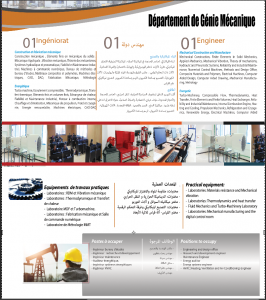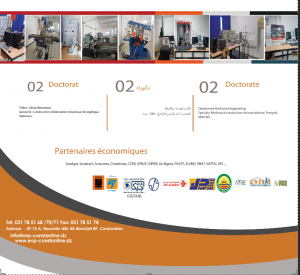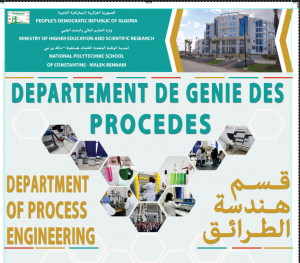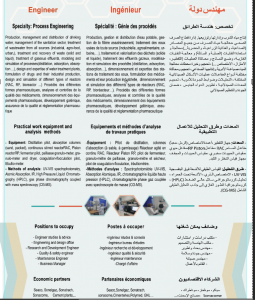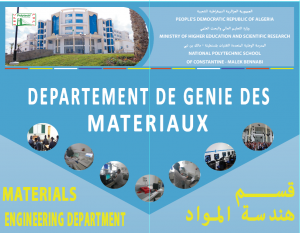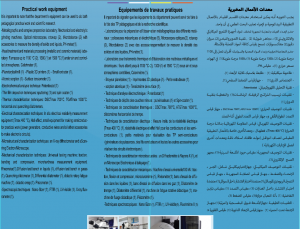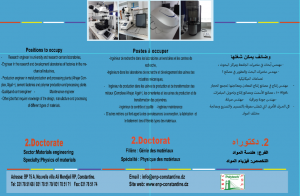DEGREE PROGRAMS OFFERED AT THE ENPC
-
ENPC offers you an excellent engineering education in a unique university context.
-
It offers degree program in areas of current interest based on a finely tunned judicious mix of theoretical knowledge and practical applications.
-
The best students of the ENPC can carry out the last year internship in universities abroad through cooperation agreements.
TRAINING OFFERS OF THE ENPC
- 01
- 02
- 03
01- First year
1.1 Subjects taught
Mathematical Analysis, Physics, Chemistry, Probability and Statistics, Algebra, Technical Drawing, Computer Aided Design, Computer Science, Human Engineering, General Economics, English and French.
1.2 Laboratory equipment
– Physics Laboratory: Free fall, Friction on an inclined plane, Coulomb’s law, Oscillating pendulum, Biot and Savart’s law, Wheatstone bridge, Use of the oscilloscope, Charging and discharging of a capacitor
– Chemistry Laboratory: Study of Perfect Gases, Calorimetry, Study of Phase Changes, Molecular Models.

02- Second year
2.1 Subjects taught
Mathematical Analysis, Mechanical Vibrations and Waves, Analytical Chemistry, Organic Chemistry, Rational Mechanics, Strength of Materials, Computer Science, Numerical Analysis, Fluid Mechanics, General Electronics, English and French.
2.2 Laboratory equipement
– Physics Laboratory: One and Two Dimensional Vibrations, Coupled Pendulum, Forced Oscillations, Ultrasonic Waves, Influence of Temperature on the Speed of Sound in Liquids, Polarization of an Electromagnetic Wave
– Electronics Laboratory: Operational Amplifiers, Single Phase Circuit, Three Phase Power, Filtering and Rectification.
– Other: Universal Testing Machines (Traction, Flexion, Compression), Hydraulic Bench (Fluid Statics and Hydrodynamics), Three (03) Computer Rooms.

03- Opportunities
At the end of two first (02) years of the preparatory class program and after passing with success the national competition exams, students then join one of the engineering programs in one of the national engineering schools in the country. Or failing so students can always pursue their studies by joining the third year at one of the national universities in a program of their choice.
- 01
- 02
01- Engineering
Electrical engineering
Electrical machines, electrical networks, production, transport and distribution of electrical energy, control and command, protection, equipment, high voltage, renewable energies, microcontrollers and computers
Automation
Programmable industrial controllers, system control, system identification, modeling-simulation, production engineering, regulation, feedback; robotics, process supervision.

Laboratory Equipment
Laboratories: DC electrical machines (shunt, series and compound), AC electrical machines (asynchronous and synchronous), – Laboratories: HV, electrical networks, switchgear, digital electronics. – Laboratories: Six-axis robot with sensors, Helicopter, 4-level didactic elevator, PLC, Real-time laboratory (Opal RT)
Graduates can work as:
– Design and consulting engineer
– Design engineer
– Research and Development Engineer
– Quality & Safety Engineer
– Maintenance engineer
– Business Manager
Economic partners:
(Sonelgaz, Sonatrach, Sonacome, Cimenteries, …)

02- Doctoral degree
Filed of study:
Area : Electrical Machines
Filed of study: Automation
Area: Industrial Automation & Computing
Area: Automation & Systems
01- Engineering
Mechanical engineering and manufacturing
Mechanical construction, Finite elements in solid mechanics, Applied mechanics, Mechanical vibration, Theory of mechanisms, Hydraulic and pneumatic systems, Reliability and industrial maintenance, Numerical control machines, Methods and design office, Composite and polymer materials, Electrical machines, CAD, Mechanical manufacturing, Metrology
Energetic
Turbo machine, Compressible flow, Thermodynamics, Heat transfer, Finite elements and finite volumes, Heat exchanger, Reliability and industrial maintenance, Internal combustion engine, Heating and air-conditioning, Propulsion mechanics, Cold and cryogenics, Renewable energy, Electrical machines, CAD
Laboratory Equipment
Laboratory Equipment
– Strength of Materials and Mechanical Vibration Laboratories
– Thermodynamics and Heat Transfer Laboratories
– Fluid Mechanics and Turbomachinery Laboratory
– Manufacturing and Numerically Controlled Machines Laboratories
– Measurements and Metrology Laboratory
Graduates can work as:
– Design engineer
– Research and Development Engineer
– Maintenance engineer
– Energy auditor
– energy systems engineer
– HVAC Engineer
Economic partners
(CPG, CMT, Sonatrach, Sonelgaz, Cement factories, automotive industry…)

02- Doctoral degree
Filed of study : Mechanical Engineering
Areas :Mechanical engineering and manufacturing, Energy, Materials
- 01
- 02
- 03
01- Engineering
Option: Process Engineering
Production, management and distribution of potable water, treatment of waste water from all sources (industrial, agri-food, urban, etc.), treatment and recovery of waste (solid and liquid), treatment of gaseous effluents, modeling and simulation of processes (distillation, adsorption, absorption, etc.), design and expertise of water treatment plants, formulation of drugs and their industrial production, sizing and simulation of different types of reactors (RAC, RP, bioreactor, etc.). Processes of different pharmaceutical forms, analysis and quality control of drugs, design of pharmaceutical equipment, galenic development, quality assurance and pharmaceutical regulation.
Laboratory equipment
- Equipment: Distillation pilot, plant, absorption columns (sand, packed), Continuously stirred reactor, Piston reactor, fermentation pilot plant, benchtop granulometer, granulometer and dryer, coagulation-flocculation pilot plant, ebulliometer.
- Analytical methods equipment: UV-VIS Spectrophotometry, Atomic Absorption, IR, High Pressure Liquid Chromatography (HPLC), Gas Chromatography coupled with Mass Spectroscopy (GC-MS).
Graduates can work as:
– consulting engineer
-Design engineer
-Research and development engineer
-Quality & Safety Engineer
-Maintenance engineer
-Business manager
Economic partners
Seaco,Sonelgaz, Sonatrach, sonacome,Cimenteries,Polymed, GNL…
02- Doctoral degree
Area: Process Engineering.
- 01
- 02
- 03
- 04
01- Engineering
Advanced materials
The engineer in materials engineering will develop the ability to master the broad structure-property relationships of a material. The curriculum is based on a balance between theory and practice: physics of materials; phase transformations; crystallography; mechanical behavior; elaboration processes of metallic, ceramic, polymer and composite materials; physics of semiconductors and components for microelectronics, optoelectronics and photovoltaics; innovative materials; characterization techniques.
Laboratory Equipment
It is important to point out that the department’s equipment can be used for both teaching and scientific research.
– Laboratory for the preparation and metallographic observation of different materials: mechanical and electrolytic polishers (5), optical microscopes (2), rotavap (2), microbalance (2) with accessories for measuring the density of solids and liquids, PH-meter (1).
– Laboratory for heat treatment and elaboration of metallic and ceramic materials: furnaces up to 1100 °C (2), 1300 (1) and 1500 °C (1) under air and controlled atmospheres, Calorimeter (1).
– Planetary mill (1) – 3D plastic printer (1) – Small extruder (1). – Atomic sorption (1) – Surface tensiometer (1).
– Electrochemical analysis technique: Potentiostat (1)
– Thin film deposition techniques: sprays (1) and spin-coater (1).
– Thermal characterization techniques: DSCTmax 700°C, ATGTmax 1000°C, horizontal and quenching dilatometers.
– Electrical characterization techniques: Insitu measurement of electrical resistivity (Tmax 400 °C) (1), electrical resistivity and Hall effect for conductors and semiconductors (1), small materials for realization of semiconductor TP (power generators, conductive wires and all other accessories to realize electronic circuits).
– Microstructural characterization techniques: an X-ray Diffractometer (1), and a Scanning Electron Microscope (1).
– Mechanical characterization techniques: Universal testing machine100 kN: tensile, bending and compression, microdurometer (1), Rheometer (1), Liquid diffusion test bench (1), Gas diffusion test bench (1), Quenching dilatometer (1), Differential dilatometer (1), Didactic rotary fatigue machine (1), Didactic creep machine (1). Piezometer (1).
-Spectroscopic techniques: Nano-Sizer (1), FTIR (1), UV-visible(1). Fluorimeter X (1)
Graduates can work as:
-Research engineer in university laboratories and research centers
-Engineers in the research and development laboratories of the mechanical industries
– Production engineer in metal production and processing plants (Alhajar Complex, Algal+), cement plants and polymer production and processing plants
– Production engineer in metal production and processing plants (Alhajar Complex, Algal+), cement plants and polymer production and processing plants
-Maintenance engineer
– Other trades that require knowledge of the design, manufacture and processing of different types of materials
Economic partners
(Saidal, Pharmidal, AAHP, CMT, Sonatrach, Cimenteries, CPG…).

02- Doctoral degree
Field of study: Materials engineering
Area: : Physics of materials





